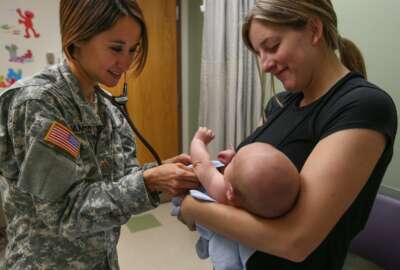VA to broaden coverage of infertility benefits for veterans
The Department of Veterans Affairs, pivoting to align with the Defense Department, will soon remove health care coverage requirements that advocates have said...
Alongside military members, now veterans will also see broader coverage of in vitro fertilization (IVF) procedures through the Department of Veterans Affairs.
VA, following in the footsteps of the Defense Department, announced plans to undo a health care policy that advocates have said discriminates against LGBTQ+ and unmarried veterans.
By lifting requirements for veterans to be married and to provide their own eggs and sperm to qualify for coverage of IVF procedures, more veterans will soon be able to access this type of care through VA’s health care program.
The update from VA comes after DoD announced plans to update TRICARE’s policy on IVF, in effect giving access to active-duty service members who are either unmarried or in same-sex marriages.
“Given VA’s continued commitment to aiding veterans in starting families, VA has determined that it will also amend its IVF policy to align the coverage it provides with that available under the forthcoming amended DoD policy,” VA said in a joint letter on Jan. 25.
The changes come in response to a lawsuit first filed in August 2023, which alleged that the strict requirements from both VA and DoD to qualify for coverage of IVF discriminate against LGBTQ+ and unmarried veterans and military members.
Part of VA’s latest decision to update its IVF qualifications was due to its health care policy being intertwined with the Defense Department’s policy.
“DoD recently determined that it will change its policy regarding IVF benefits, and the legal authority governing VA makes DoD’s policy change relevant to VA’s policy,” VA Press Secretary Terrence Hayes said in a statement to Federal News Network. “To fulfill VA’s commitment to aiding veterans in starting families, VA will continue to review potential changes to our policy, taking into account any changes to DoD’s policy.”
Veterans can also get other infertility treatment benefits through VA’s health care program, including assessments and counseling, lab tests, ultrasounds, X-rays, surgical correction, medications, artificial insemination, egg freezing and sperm cryopreservation.
VA did not offer a specific timeline on implementation, but DoD said it expects to finalize the details of its IVF policy change by the end of February. DoD will then begin implementing the changes this spring.
“DoD is currently in the process of determining the exact contours of the policy amendments,” the Jan. 25 document stated.
Leaders at the National Organization for Women–New York City (NOW-NYC) — the organization that first filed the lawsuits against DoD and VA — said while they commend the plans to remove requirements and make IVF coverage more accessible, it’s not the end of the road.
“We will continue to advocate for service members because there are other requirements to be fully eligible for reproductive health care that have to be changed,” Sonia Ossorio, executive director of NOW-NYC, said in a recent interview with Federal News Network.
Both DoD and VA have another requirement for members and veterans to qualify for IVF coverage: The infertility they experience must be proven to have stemmed from a service-connected disability, or a serious injury or illness that resulted from military service.
NOW-NYC, in the August 2023 lawsuit, said the policy is discriminatory, and that it excludes many couples — like LGBTQ+ couples who cannot conceive without IVF, and those whose IVF needs stem from other injuries and disabilities.
“As such, NOW-NYC will continue to challenge both DoD and VA to remove all unlawful and prohibitive restrictions on IVF care,” NOW-NYC said in a statement.
Additionally, Ossorio said, the current requirements are both an extremely high bar, and simply unfair.
“The obstacles really are very difficult,” Ossorio said. “We have to make sure that this eligibility requirement of serious illness and serious injury related to duty is changed. Otherwise, it’s policy not in practice, but mostly only in words. Our service members deserve more.”
Copyright © 2025 Federal News Network. All rights reserved. This website is not intended for users located within the European Economic Area.
Drew Friedman is a workforce, pay and benefits reporter for Federal News Network.
Follow @dfriedmanWFED







